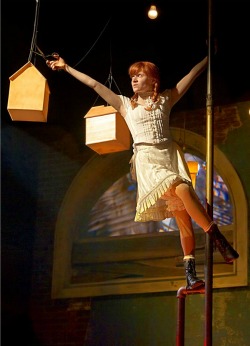Chicago’s fast burn is a dramatic flame-out
Review: “The Great Fire,” by John Musial, at Lookingglass Theatre through Nov. 20 **
By Lawrence B. Johnson
 Fire, in the red-haired cat-like figure of a woman, bounds across the city of Chicago, leaping its rivers, spewing the hot cinders of calamity over neighborhoods rich and poor. It is the night of Oct. 8, 1871, the night Chicago burned to the ground, revisited in John Musial’s play “The Great Fire” at Lookingglass Theatre.
Fire, in the red-haired cat-like figure of a woman, bounds across the city of Chicago, leaping its rivers, spewing the hot cinders of calamity over neighborhoods rich and poor. It is the night of Oct. 8, 1871, the night Chicago burned to the ground, revisited in John Musial’s play “The Great Fire” at Lookingglass Theatre.
Musial, a veteran member of the Lookingglass ensemble, wrote “The Great Fire” for this company, which gave the premiere in 1999. This is the play’s first revival.
You can’t take your eyes off Lindsey Noel Whiting as The Fire — lithe, consuming and capricious. Dressed in pale ruffles, Whiting becomes the cool, methodical purveyor of blazing destruction, the pallid arbiter of death who takes one victim in her warm embrace, the next by furious assault – and spares the third.
On this fell night, Chicago – all of it, from the southwest side, across the Loop, up through Michigan Avenue’s magnificent immolation and beyond the water tower — was The Fire’s playground. So bewitching is Whiting’s dance, the invention of choreographer Julia Rhoads in its graceful pounces and kinetic intertwining with the terrified townsfolk, that “The Great Fire” could easily be imagined as pure ballet, the citizenry rendered as puppets pushed and pulled by this flaming-haired force of nature.
And yet as a play, which Musial also directs here, it makes for weakly contrived drama that attempts to put a human face on the disaster only to leaves us wondering why we should care about this assortment of stock characters. At least Mrs. O’Leary doesn’t show up with her poor maligned cow.
Five actors play multiple roles, portraying a well-to-do family that sees its good life go up in flames, a poor immigrant household whose members (among them adult actors scrunched as children) get tossed about through the night, a corrupt city councilman who sees the fire as his leg up on re-election, a present-day fire marshal who explains a lot of stuff, and so forth. A couple of times, by way of commenting on the action, the company breaks into a music-hall ditty.
While I can’t attest to the lyricism of the play’s ample Polish dialogue, Musial’s English conversations tend toward the trite and vacuous. The most ear-catching ideas come from the rich folks’ servant Frenchy, who is recalling that terrible night some 50 years later. Frenchy, imbued with vitality and persuasive depth by Kevin Douglas (who takes no other role), is indeed the show’s most engaging character other than The Fire.
Visually (and sonically), “The Great Fire” is great fun, odd though that word may sound here. John Dalton’s set design incorporates walls that are only fire-resistant, if you know what I mean, and a sky filled with miniature buildings to symbolize the inferno’s annihilation of homes, businesses and government buildings. Josh Horvath and Ray Nardelli share credit for assorted, highly effective sonic booms.
Still the sum is not convincing. Self-consciously busy in its constant costume changes and vaudeville digressions, “The Great Fire” ultimately takes on a campy feel, a hot time in the old town — the madness of “Noises Off” with a sober mien.
Photo caption: Lindsey Noel Whiting portrays The Fire. Photo by Sean Williams
Tags: John Musial, Lookingglass Theatre, The great Chicago fire

